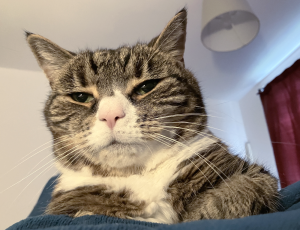Plus the state of UK TV, the power of curation and an early morning Grabbity.
Hi there,
The rain has finally stopped, the sun is trying to come out, the pigeons are ‘courting’ on the flat roof above my desk, freaking Copurrnicus right out with their noise, and I am feeling loquacious! So this issues sees fewer links and more analysis, which I hope you’ll find interesting! Plus, a photo of an early morning Grabbity for those of you who reach the end.
Read this: Why bestseller lists aren’t all that
Agent Kate McKean argues that authors really shouldn’t care about whether their books gets on to the New York Times bestseller list, largely because, “If it happens that is AMAZING and a BIG DEAL but also not the golden ticket you think it will be.”
Instead, she says, you should worry more about:
Selling through that print run so your publisher has to go back to press for more books (i.e. a reprint). If they have to order a reprint before your book even comes out, because stores have called dibs on all their existing stock, EVEN BETTER. What’s going to make a publisher look at your next proposal or manuscript with heart eyes? Reprints and low returns. Stores ordering more of your book(s) because people keep buying them, long after your “launch week” marketing extravaganza. How do you sell your next book? Sell your current one.
By the way, I only recently learnt that the little daggers next to some books in the NYT list means that they think the numbers have been in some way fudged:
Institutional, special interest, group or bulk purchases, if and when they are included, are at the discretion of The New York Times Best-Seller List Desk editors based on standards for inclusion that encompass proprietary vetting and audit protocols, corroborative reporting and other statistical determinations. When included, such bulk purchases appear with a dagger (†).
Read this, two: How important is author promo?
In the post above, McKean suggests that as an author, you must keep your “book in conversations by doing what you can do online—writing, posting, videoing, whatever you can do that makes sense for your market—whether it’s about your book or not.”
She goes on to say:
This is work only you can do in support of your career, so you can keep publishing books. The publisher cannot build your platform or following or fanbase of readers who automatically buy your next book as soon as you post a pre-order link. Readers are not looking at publishers for news of those pre-order links. They are looking at you. You do not hear about new books from publishers. You hear about them from friends and articles and random posts that get shared in your feeds and from the bio at the end of that great article you just read and oh look they have a new book coming out.
However, author Melissa Caruso suggests on Bluesky that we should not focus on making any given book a success, but should take a step back and make sure our careers are a success (my bold).
Here’s the thing. There’s not much that you, the author, can do personally to move the needle in the short term on sales for a specific book. That’s really up to your publisher, who has far more resources than you do.
Once you accept this, it’s actually kind of nice?
It’s very easy to put WAY too much effort, time, and/or money into book promo, but the truth is that all the things debuts feel like they should be doing—social media, preorder campaigns, events, you name it—will make very little difference for most people and are only worth doing if you enjoy them.
It’s important to remember that there is no empirical way to understand what makes a given book a success, or not a success. There are so many factors that combine to propel a title to the top of the bestseller list or sink it without trace that it’s impossible to predict which books will sell well and which won’t.
Some factors are always going to be important, such as author name recognition and track record or the amount of marketing spend devoted to a book. But they aren’t guarantees of success, even if they help it along. Other factors are completely unpredictable and uncontrollable, such as whether a similar book comes out at the same time, general zeitgeist, and virality.
So I think the key point from Caruso’s thread is to do what you enjoy. If you like being on BookTok, or writing newsletters, or doing outreach to indie bookshops, or organising author events, then go for it. It can’t hurt and it might help.
But don’t sacrifice your next book, or your health or happiness, on the altar of promo.
Read this, three: The state of UK TV
It’s really nice to have your career decisions exonerated by a report, even if that report makes for less than happy reading otherwise. Televisual.com summarises a report from Ampere Analysis on current TV commissioning trends, and it doesn’t make for fun reading.
The report shows an 18% decline last year in the UK’s market for scripted TV commissions as major UK broadcasters cut spend and most global SVODs trimmed investment in international content.
So trying to get a TV script commissioned, especially as an early career writer, is essentially futile. Worse, trying to get a sitcom made is now just an act of self-flaggellation.
Comedy fell out of favour, enduring a 27% drop. It was the most heavily impacted of all scripted genres in 2023 with an overall decline of 41% among UK commissioners.
There is something to be said for being countercyclical, so perhaps still worth working on comedy, but maybe not in TV. I’m focusing on writing a sitcom podcast as well as working on a version of the script for submission to the BBC’s autumn open call, just in case.
Perhaps the ‘easiest’, if anything in the creative world can ever be said to be easy, is get your book published first.
In another risk-mitigation move, the BBC increased its investment in IP with an existing following. Roughly a fifth of BBC scripted commissions last year were book adaptations.
I decided a while back to stop working on the scripts for Tag and start novelising it. That project’s shelved for now as I focus on Fieldwork, mind, but as a CGI heavy urban fantasy, it’ll be a much easier sell as a book rather than a TV show. I always knew that, but this news confirmed that novelisation is the right choice.
However, if you’re writing in the Kids, Family or Crime genres you stand more of a chance.
Children & Family grabbed the most orders of the BBC’s scripted commissions, up by 23% year-on-year. Crime and thriller titles were up 16%.
Getting into TV through the front door is basically impossible now, so it’s really a matter of working out whether you can slip in unnoticed through a side window.
Read this, four: The power of curation
Lovely piece from Russell Nohelty about the important of curation in media, saying that:
[the problem for] every media company struggling right now is they have become terrible curators for their audience
This is true not just for large media organisations, but also for us newsletter writers too, whether we are curating links, as I do here, or our thoughts, as I do over on Why Aren’t I Writing?.
This gives me the opportunity to ask you what you’d like to see more/less of? This issue has been particularly wordy, but how do you like the usual mix of topics and number of links? Please do leave a comment if there’s something you particularly like and would like more of!
Obligatory cat picture
 Grabbity does love to come and pin me to the bed just at about the time my alarm goes off, so I frequently wake up to this view. She’s very keen that I stay in the prone position so that she can nap in comfort, after a very tiring night of yelling at us from the bottom of the stairs.
Grabbity does love to come and pin me to the bed just at about the time my alarm goes off, so I frequently wake up to this view. She’s very keen that I stay in the prone position so that she can nap in comfort, after a very tiring night of yelling at us from the bottom of the stairs.
Right, that’s it for now! See you again in a couple of weeks, or maybe in the comments!
All the best,
Suw
{ Comments on this entry are closed }





